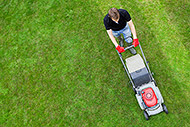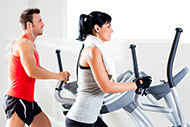
Circuit Training
When circuit training, you move quickly from exercise to exercise, with each one focusing on a different muscle group. Circuit workouts include cardiovascular exercises, strength training moves, or a combination. This type of training can be done with free weights, machines, or no equipment at all. Circuit training is often timed, so you might do squats for 45 seconds, take 15 seconds to switch exercises, and then do jumping jacks for 45 seconds. Creating a circuit that lasts 10 minutes is ideal because you can repeat it 2 to 3 times for a full 20 to 30-minute workout.
DOMS (Delayed Onset Muscle Soreness)
DOMS is the muscle soreness you feel 12 to 72 hours after exercise. All types of activities can produce DOMS, affecting both new and advanced exercisers. This type of muscle soreness is not a result of lactic acid buildup but rather due to the repair process for the microscopic damage to muscle fibers caused by exercise. The American College of Sports Medicine recommends that one of the best ways to reduce DOMS is to progress slowly with a new exercise program and give your muscles time to adapt. DOMS fades in 3 to 5 days, leaving the muscle prepared to handle the exercise once again.
Dynamic Stretching
Dynamic stretching is stretching with slow and controlled movements. This is different from static stretching, which involves holding a stretch to elongate the muscle. It also should not be confused with ballistic stretching or bouncing during the stretch, which could cause injury. Dynamic stretching is recommended as part of a warm-up before exercise. It heats up the body by increasing blood flow and elongates the muscles with each controlled movement. Examples include arm circles, leg swings, knee lifts, and butt kicks.
Isometric Contraction
An isometric contraction (or isometric hold) occurs when you use a muscle, but there is no joint movement or stretching of the muscle. According to the Mayo Clinic, isometric exercises can help you maintain strength and are especially beneficial when recovering from injury when movement is painful. A plank and wall-sit are examples of isometric contractions.
Overload Principle
Overload is the strength training principle that for a muscle to grow stronger, it must be challenged beyond what it can currently handle. This is why lifting a weight that makes it difficult to complete the last 2 to 4 repetitions of each set is recommended. This requires your muscles to grow stronger to complete the workout. Once the muscle adapts to this load, it’s time to increase the weight again.
Repetition
Strength training is described with terms like repetitions and sets. Performing the exercise one time is a repetition. For example, one bicep curl is a repetition. A group of repetitions is a set. A set can contain any number of repetitions, typically 2 to 20.
Target Heart Rate
Your target heart rate is a range used to measure exercise intensity and ensure you are improving cardiovascular fitness. When in your target heart rate zone, your heart rate will be 75 to 85 percent of your maximum heart rate. When you first start exercising, you may be unable to work at this intensity, but this zone should serve as a goal for improving fitness. You can determine your target range using the MyFoodDiary Target Heart Rate Calculator.
VO2 Max
VO2 Max is a number that measures fitness level based on how efficiently you use oxygen during exercise. It reflects how much oxygen your body transports and uses during a workout. The more fit you are, the higher your VO2 Max. Regular cardiovascular exercise that keeps your heart rate in your target heart rate zone improves VO2 Max.
Sources



 5 Ways to Burn 300 Calories this Weekend
5 Ways to Burn 300 Calories this Weekend
 The Best Home and Garden Chores for Burning Calories
The Best Home and Garden Chores for Burning Calories
 5 Tips for Making Exercise a Habit
5 Tips for Making Exercise a Habit
 Best Ways to Stay Safe during Exercise in Hot Weather
Best Ways to Stay Safe during Exercise in Hot Weather
 11 Tips for Exercise Motivation
11 Tips for Exercise Motivation
 Signs You Need to Increase Exercise Intensity
Signs You Need to Increase Exercise Intensity
 Mistakes to Avoid When Setting Fitness Goals
Mistakes to Avoid When Setting Fitness Goals
 Essential Gear for Starting an Exercise Program
Essential Gear for Starting an Exercise Program

 Pinterest
Pinterest RSS Feed
RSS Feed